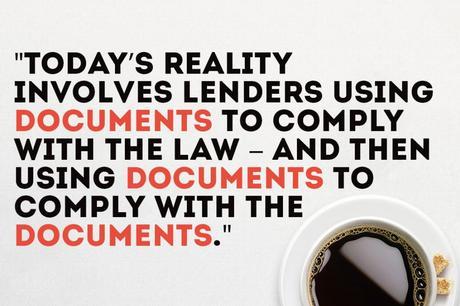In the mortgage industry, documents are the building blocks of proper business. They control every aspect of a transaction and determine the legality of every decision. As the Consumer Finance Protection Bureau (CFPB) continues to increase the pressure on compliance management, mortgage companies are beginning to understand their company-specific forms might be placing them at regulatory risk.
Company-specific documents have long provided creditors with the ability to supplement disclosures in their own language and policies. But, as the compliance environment shifted this additional paperwork has become a time bomb moments from explosion.
Why is this? Custom documents cannot be regulated. The variables that surround them can be infinite. As it will be shown, the process of creating and maintaining these forms may require more management than financial institutions might expect. If improperly handled, they may also inadvertently open companies up to compliance errors. If your company believes that a custom form has become necessary, consider the following qualifications before it becomes a time bomb:

4 Considerations About Company-Specific Documents
1) Has a general counsel or a dedicated compliance representative reviewed the document?
Company-specific forms often serve the purpose of filling a gap in regulation or clarifying a required document. Dedicated compliance management employees provide financial institutions with the ability to audit and revise forms before they are implemented company-wide. They are an invaluable resource that can help new company-specific documents become compliant under all regulations and avoid blameworthy language. Although most nonaffiliated lenders cannot keep an entire compliance management team on their budget, there are many third-party companies that can provide these services on a one-off basis.
2) Can the document be managed properly?
In many instances, company-specific documents are created for use in unique and infrequent loan situations. If left to the human element, these documents are likely to be created and soon forgotten. Provided this feature is available, custom documents can be automated through the company’s loan origination software via a document rules-engine. This allows the software to serve up these specific disclosures based on parameters your company has set and eliminates any doubt that the proper disclosures aren’t being sent to the borrower.
3) Is the document up-to-date?
Managing custom versions of state-forms, regulation-required or supporting disclosures may prove to be very difficult. When these types of documents are updated by state entities, often without alarm, custom forms may suddenly become noncompliant and place you at risk. Managing state-forms and knowing when they change can be as difficult as finding a needle in a haystack. Furthermore, as the CFPB applies more pressure on compliance policies, this haystack only becomes larger. Without being on every state agencies distribution list, this task may be too burdensome without a compliance system.
4) Is there a similar document already available?
Most custom documents already have a doppelgänger floating around. Instead of creating new paperwork, consider leveraging your company through third-party document services. Many vendors maintain and guarantee compliance by providing a full inventory of documents that they update regularly through in-house compliance departments. MortgageDashboard, for example, stores a library of over 3,200 up-to-date mortgage documents that cover conventional and government lending for all 50 states.
How to Build Better Policies
Today’s reality involves lenders using documents to comply with the law. It’s no secret that the amount of paperwork can leave any borrower uneasy. It is clear, however, that the CFPB intends to reform all aspects of the American financial institution as far down as the disclosures. During the “Know Before You Owe” campaign, the Bureau spent a considerable amount of effort to clarify and redesign common mortgage documents and consolidate disclosures. To avoid a misstep, consider the following before implementing a new custom document:
- Is it necessary?
- Can it be managed?
- Would a notice be as effective?
When new company-specific documents have been introduced, formal policies must be developed that properly inform employees of their implementation. Training must also become available. It is also important to demonstrate to employees why your company believes a new form is necessary. The new document should reference the specific regulations it is complying with.
In a summer 2013 report, the CFPB stated that an effective compliance management system had four components, including:
- A board of directors and management oversight
- A compliance program
- A consumer compliant management program
- An independent compliance audit
Though this system is not currently required, the CFPB believes these four components can lead to a successful compliance management system when well coordinated. Developing a proper compliance department can help your company keep its documents up-to-date and readily available to all of your employees. After all, these are the qualities that the CFPB tests during an audit.
How Does MortgageDashboard Manage Compliance?
As one of the leading loan origination systems, MortgageDashboard provides lenders with a complete form library with every disclosure necessary to originate and fulfill a loan. Our in-house compliance team has partnered with GreatDocs to ensure every regulation and guarantee up-to-date documents 100% of the time. Built for efficiency, MortgageDashboard can create and send disclosure packages electronically – all without leaving the system. With the paperless document management system, eBriefcase, lenders can also store all of their loan documents on the cloud and access them from any computer with an internet connection.
Financial institutions need a cost efficient system they can leverage themselves through. Discover how MortgageDashboard delivers a fully compliant system to your lenders today.
Discover More!